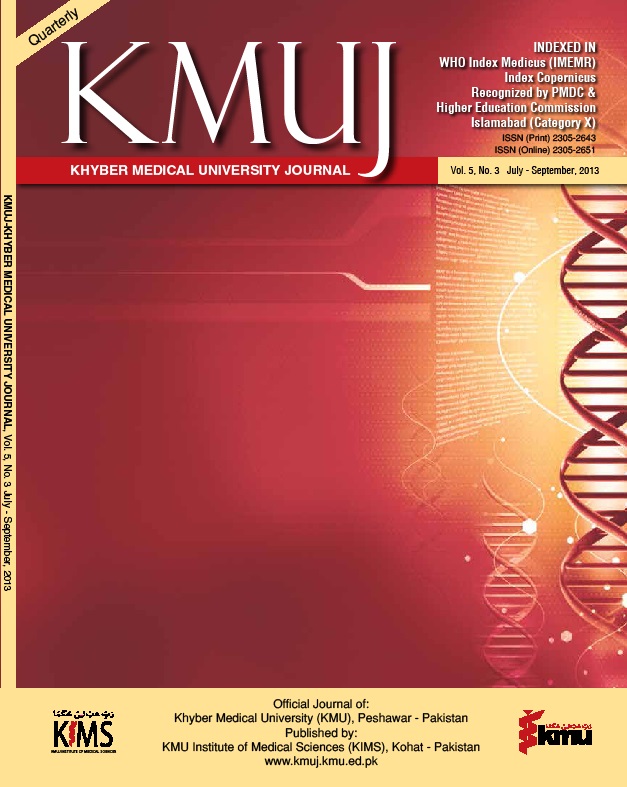INTERFERON SIGNALLING PATHWAY: INTRAHEPATIC EXPRESSION OF STAT1 IN INTERFERON RESISTANT HEPATITIS C PATIENTS
Main Article Content
Abstract
Objective: to investigate the role of STAT1 in treatment failure in interferon resistant hepatitis C virus (HCV) infected patients.
Methodology: Liver biopsies and blood from patients infected with HCV, resistant to interferon therapy were collected under sterile conditions in the laboratory of Army Medical College, Rawalpindi. Study included HCV infected patients who were positive for serum HCV RNA, and were non-responders to two courses of interferon therapy, IFN-α injection and ribavirin oral for 24 weeks periods. Study also included 10 controls i.e. 5 normal healthy subjects with normal LFTs who were negative for anti-HCV antibodies and 5 responder patients who responded to first course of interferon treatment and had normal LFTs. The liver biopsy specimens were subjected to PCR based detection of STAT1 and liver histopathology status evaluation. GeneJET™ RNA Purification Kit# K0731, Fermentas was used for total RNA isolation from liver biopsy specimen. The study was approved by institute’s ethical committee.
Results: STAT1 mRNA was detected in 96.2% (n=25/26) of the HCV patients resistant to interferon therapy and in 100% of the normal as well as responders. Patient’s distribution for histological activity index along with STAT1 mRNA expression was 68% in the score of 4-7 and 28% in the score of 8-12.
Conclusion: STAT1 mRNA is being expressed by all the HCV infected patients resistant as well as responders to interferon therapy. STAT1 expression is not a major factor responsible for interferon resistance in HCV patients.
Article Details
Work published in KMUJ is licensed under a
Creative Commons Attribution 4.0 License
Authors are permitted and encouraged to post their work online (e.g., in institutional repositories or on their website) prior to and during the submission process, as it can lead to productive exchanges, as well as earlier and greater citation of published work.
(e.g., in institutional repositories or on their website) prior to and during the submission process, as it can lead to productive exchanges, as well as earlier and greater citation of published work.
References
Dabrowska MM PAaFR. Signal transduction pathways in liver and the influence of hepatitis C virus infection on their activities. World J Gastroenterol 2009;15(18):2184–9.
Manal AE MA, Hesham AE, Sherif AE, Wael FF, Medhat AG and Hoda AS. Hepatic expression of STAT1, SOCS3 & PIAS1 in HCV Patients and their Role in Response to therapy
Canadian Journal on Medicine. 2011;2(1).
Huber JP, Farrar JD. Regulation of effector and memory T-cell functions by type I interferon. Immunology. [Research Support, N.I.H., Extramural
Review]. 2011 Apr;132(4):466-74.
Vezali E, Aghemo A, Colombo M. Interferon in the treatment of chronic hepatitis C: a drug caught between past and future. Expert Opin Biol Ther. [Review]. 2011 Mar;11(3):301-13.
Houghton M. Discovery of the hepatitis C virus. Liver Int. [Historical Article
Review]. 2009 Jan;29 Suppl 1:82-8.
EASL Clinical Practice Guidelines: management of cholestatic liver diseases. J Hepatol. [Practice Guideline]. 2009 Aug;51(2):237-67.
Sulkowski MS, Cooper C, Hunyady B, Jia J, Ogurtsov P, Peck-Radosavljevic M, et al. Management of adverse effects of Peg-IFN and ribavirin therapy for hepatitis C. Nat Rev Gastroenterol Hepatol. [Research Support, Non-U.S. Gov't
Review]. 2011 Apr;8(4):212-23.
Averhoff FM, Glass N, Holtzman D. Global burden of hepatitis C: considerations for healthcare providers in the United States. Clin Infect Dis. [Research Support, Non-U.S. Gov't]. 2012 Jul;55 Suppl 1:S10-5.
Ashfaq UA, Javed T, Rehman S, Nawaz Z, Riazuddin S. An overview of HCV molecular biology, replication and immune responses. Virol J. [Review]. 2011;8:161.
Asselah T, Estrabaud E, Bieche I, Lapalus M, De Muynck S, Vidaud M, et al. Hepatitis C: viral and host factors associated with non-response to pegylated interferon plus ribavirin. Liver Int. [Research Support, Non-U.S. Gov't
Review]. 2010 Oct;30(9):1259-69.
Qudsia Bashir AR, Abdul Khaliq Naveed, Rao Saad Ali Khan, Suhail Razak, Aqeel Younis, Muhammad Ashraf. Intrahepatic Expression Analysis of Interferon Alpha Receptor 1 in HCV Patients Resistant to Interferon Therapy. Article in process. 2013.
Qureshi S, Batool U, Iqbal M, Qureshi O, Kaleem R, Aziz H, et al. Response rates to standard interferon treatment in HCV genotype 3a. J Ayub Med Coll Abbottabad. 2009 Oct-Dec;21(4):10-4.
BO C. Predicitve factors for response to treatment of chronic hepatitis C. Ann Hepatol. 2006;5(Suppl. 1):S24-S8.
Sohail Bhutta Wu, Muzamil Jamil. Short Duration Therapy with Standard Interferon and Ribavirin in Chronic Hepatitis-C Genotype 3a Patients. Is it too short? Ann Pak Inst Med Sci 2011; 7(2): 86-89. 2011.
Bhutta S WU, Jamil M. Short Duration Therapy with Standard Interferon and Ribavirin in Chronic Hepatitis-C Genotype 3a Patients. Is it too short? Ann Pak Inst Med Sci. 2011;7(2):86-9.
Kim YJ, Cho SB, Park SW, Hong HJ, Lee du H, Cho EA, et al. Body mass index and nonresponse to antiviral treatment in korean patients with genotype 2 and 3 chronic hepatitis C. Chonnam Med J. 2012 Apr;48(1):21-6.
Kumthip K, Chusri P, Jilg N, Zhao L, Fusco DN, Zhao H, et al. Hepatitis C virus NS5A disrupts STAT1 phosphorylation and suppresses type I interferon signaling. J Virol. [Research Support, N.I.H., Extramural
Research Support, Non-U.S. Gov't]. 2012 Aug;86(16):8581-91.
Lin W, Kim SS, Yeung E, Kamegaya Y, Blackard JT, Kim KA, et al. Hepatitis C virus core protein blocks interferon signaling by interaction with the STAT1 SH2 domain. J Virol. 2006 Sep;80(18):9226-35.
